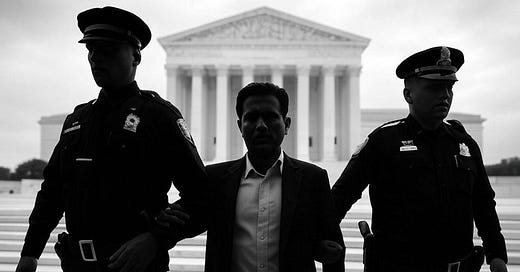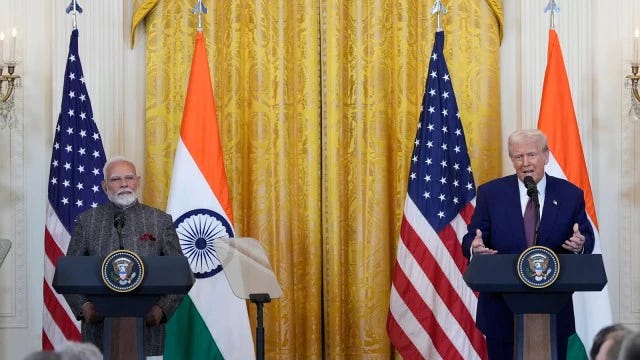The 26/11 Mastermind Tahawwur Rana to be Extradited from USA to India: US Supreme Court Rejects his Petition
The soil of this nation absorbs the blood of its martyrs—and returns it as fire in its pursuit of justice. Rana will now face that fire.
Tahawwur Rana Case: Journey from Pakistani Military Officer to 26/11 Conspirator Facing Indian Justice
In a thunderous reaffirmation of the global war against terrorism, the United States Supreme Court, barely hours ago, on April 7, 2025, rejected the final plea of Tahawwur Hussain Rana—an ex-Pakistani military doctor turned transnational terror facilitator—paving the way for his extradition to India. This judgment is not merely a legal pronouncement; it is a reckoning. After years of legal acrobatics, and media pyrotechnics, Rana is finally set to face justice for his role in one of the most barbaric attacks in modern history: the 26/11 Mumbai terror attacks.
It is a moment of vindication for every Indian, a triumph of grit and diplomacy, and a sharp rebuke to the terror factories thriving in Pakistan’s military-intelligence complex.
A Face Behind the Facade: Rana’s Deceptive Journey
Born in Pakistan’s Chichawatni on January 12, 1961, Tahawwur Rana appeared, at first glance, to be an accomplished professional—an Army medical officer, a globe-trotting immigration consultant, a halal meat entrepreneur. But beneath the polished exterior was a man deeply embedded in a terror network that spilled innocent Indian blood.
After leaving Pakistan’s Army Medical Corps, he moved to Canada and became a citizen in 2001. By then, he had already laid the foundation of his dual life—respectable businessman to the world, and covert terror enabler to his true masters in Pakistan’s shadowy security apparatus.
In Chicago, Rana ran First World Immigration Services, an operation that would become the launchpad for his deeper plunge into jihadist machinations. He also maintained personal and operational ties with David Coleman Headley, a fellow Pakistani-American and childhood friend from Cadet College Hasan Abdal—a bond that would become a bridge to massacre.
The 26/11 Bloodbath: Rana’s Role in the Mumbai Carnage
While ten gun-wielding Pakistani terrorists turned Mumbai’s bustling streets into killing fields from November 26 to 29, 2008, the man who helped them get there sat continents away. But make no mistake—Rana’s fingerprints are all over the crime scene.
He enabled Headley to set up a sham immigration office in Mumbai to serve as cover for reconnaissance.
He arranged a falsified Indian tourist visa for Headley to bypass scrutiny.
He funded Headley’s travel, his hotel stays, and operational expenses in India.
Most chillingly, he stayed at the iconic Taj Mahal Palace Hotel—later reduced to flames and bodies by terrorists—just days before the attack.
This wasn’t coincidental. It was calculated. It was an operation backed by Lashkar-e-Taiba, enabled by the ISI, and facilitated by men like Rana who traded their souls for ideology.
Beyond Mumbai: A Plot to Behead Journalists in Copenhagen
Rana’s criminal tentacles extended beyond India. He played a vital role in planning an attack on the Jyllands-Posten newspaper in Denmark, which had published cartoons of the Prophet Muhammad. The planned reprisal was not merely violent; it was medieval. The terrorists intended to storm the office, behead the journalists, and dump their severed heads on the streets.
Such grotesque acts were not isolated incidents but part of a larger jihadist narrative, nurtured and nourished by the Pakistani deep state, of which Rana was a loyal operator.
Ties to Lashkar-e-Taiba and the ISI: Pakistan’s Proxy Wars Unmasked
Evidence has repeatedly pointed to Rana’s links with Lashkar-e-Taiba—a designated foreign terrorist organization responsible for a long string of attacks across India. Even more damning is his own admission: that he believed Headley was working on behalf of the ISI, Pakistan’s rogue intelligence agency. In a failed defense during his US trial, Rana sought to sanitize his role as merely that of a patriot helping his country’s spy agency.
This narrative not only confirms his guilt but exposes Pakistan’s sinister strategy of outsourcing terrorism through "non-state actors" while maintaining superficial deniability. Rana is not a lone wolf; he is one among many of Pakistan’s proxy warriors who operate across continents with impunity—until now.
The Long Legal War: Rana’s Judicial Labyrinth in America
Rana’s arrest in Chicago in 2009 marked the beginning of a protracted legal battle. Though a U.S. court in 2011 acquitted him of direct involvement in the Mumbai attacks, it convicted him for supporting Lashkar-e-Taiba and conspiring to attack Jyllands-Posten. He was sentenced to 14 years in prison—a slap on the wrist considering the gravity of his crimes.
Released early on compassionate grounds in 2020, Rana probably thought he had outwitted the system. But India moved swiftly. A magistrate judge in California issued a fresh arrest warrant the very next day based on India’s 2019 extradition request. From there, Rana began a desperate and ultimately futile campaign to evade Indian justice.
His legal arsenal included:
Claims of "double jeopardy"
Habeas corpus petitions
Emergency appeals to Justices Elena Kagan and John Roberts
Excuses of health ailments and religious persecution
Even a comparison to arms dealer Sanjay Bhandari’s failed UK extradition
Each attempt was systematically dismantled in U.S. courts, culminating in the final hammer blow from the Supreme Court on April 7, 2025.
The Trump Administration's Decisive Support for India
A dramatic shift occurred with the Trump administration’s return to power. In a joint press conference with Prime Minister Modi in February 2025, President Donald Trump declared that Rana’s extradition had been approved. Secretary of State Marco Rubio swiftly formalized the surrender.
This moment underlined a critical message: The United States, under resolute leadership, stands with India against the scourge of Islamist terrorism and will not allow its soil to become a safe haven for agents of death.
The Road Ahead: India Readies for a Landmark Trial
India’s National Investigation Agency (NIA) awaits the final transfer of custody. When Tahawwur Rana lands on Indian soil, he will face charges not just for conspiracy and abetment but for abetting the mass murder of innocents, including children, police officers, and foreign nationals.
It will be the first time Indian agencies get to interrogate this handler of terror. The hope is that his extradition will finally expose:
The granular planning of 26/11
The role of ISI officers who pulled the strings
The larger architecture of Pakistani-backed terrorism
Justice will not only be done—it will be seen to be done, in Indian courts, under Indian law, for Indian lives.
In Summary: The Long Arm of Justice Has Reached Across Oceans
The saga of Tahawwur Rana’s extradition is not just the story of one man’s fall—it is the story of a nation’s unrelenting pursuit of justice, a global fight against terror, and a moment of reckoning for Pakistan’s policy of exporting jihad.
India has waited seventeen long years. Families of 26/11 victims have wept, mourned, and waited for closure. Today, their grief finds a voice in the promise of justice.
Pakistan may continue to breed more Ranas, more Headleys, and more Kasabs. But let them remember: India never forgets. The soil of this nation absorbs the blood of its martyrs—and returns it as fire in its pursuit of justice. Rana will now face that fire.
Let the world watch. Let justice roar.
Footnote: Who is David Coleman Headley?
David Coleman Headley, born as Daood Sayed Gilani on June 30, 1960, in Washington, D.C., is a Pakistani-American terrorist and a key figure in the planning and execution of the 26/11 Mumbai attacks. The son of a Pakistani diplomat and an American woman, Headley spent much of his early life in Pakistan and studied at the Cadet College Hasan Abdal, where he developed a close friendship with Tahawwur Rana.
After moving to the United States at age 17, Headley battled drug addiction and changed his name in 2006 to conceal his Pakistani origins during covert trips to India. Recruited by the Pakistan-based terror group Lashkar-e-Taiba (LeT) in 2002, Headley conducted meticulous reconnaissance missions in Mumbai under Rana’s logistical cover and later plotted an attack on the Danish newspaper Jyllands-Posten.
He was arrested by the FBI in 2009, pleaded guilty to multiple terrorism charges, and received a 35-year prison sentence. In exchange for cooperation with U.S. authorities, Headley avoided extradition to India but has provided crucial testimony via video link in Indian courts. Despite India’s extradition request, he continues to serve his sentence in the United States under protective custody.
President Trump Announces Tahawwur Rana’s Extradition, Strengthening of India-US Ties
US Approves Tahawwur Rana’s Extradition to India






This case is a testament to the fact that Governments save the criminals from courts and punishment. Same person, couldn't be extradited because the request fell of the deaf ears of useless Biden, who was remote controlled by Obama (a staunch leftist and terror supporter). If governments start behaving rational by keeping their political interests, the organized crime can come to an end and unorganized crime can reduce to personal levels.
Congress governments in India did the same, saved the terrorists, shook hand with them in PMO, just to keep their vote bank happy. Governments from 1947 to 2014 have done everything they could to keep the country poor, disturbed and corrupt. Modi govt is doing its bit to change the discourse to some extent, but not enough.